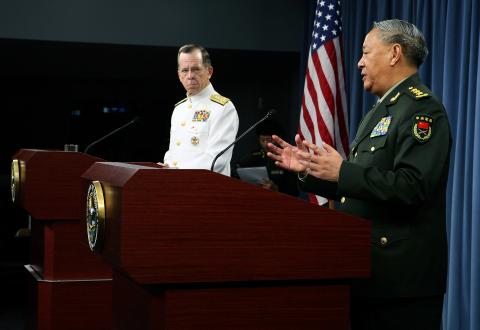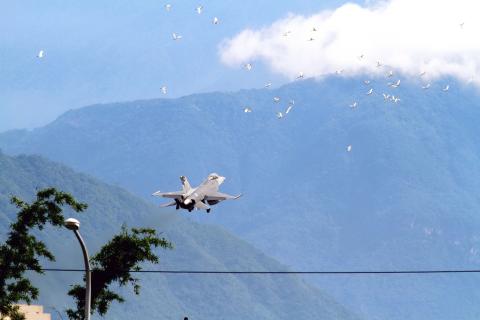A top Chinese military official warned the US that military and diplomatic relations with Beijing would suffer if Washington sold advanced weapons to Taiwan. The official also attacked the Taiwan Relations Act as a device used to interfere with China’s “domestic” affairs.
“As to how bad the impact [of US arms sales to Taiwan] will be, it would depend on the nature of the weapons sold to Taiwan,” People’s Liberation Army (PLA) Chief of General Staff Chen Bingde (陳炳德) said in Washington.
Sources close to the administration of US President Barack Obama said Beijing was mainly opposed to the sale of F-16C/D aircraft, which Taipei has repeatedly requested.

Photo: AFP
Obama is not expected to announce a decision on the sale of the fighters until later this year.
Sources said that one of Chen’s main missions in visiting the US this week was to emphasize the strength of China’s opposition to the arms sale.
Speaking at a joint press conference with US Chairman of the Joint Chiefs of Staff Admiral Mike Mullen, Chen said he had conducted “very frank, in-depth and fruitful discussions” with US leaders.

Photo: Yu Tai-lang, Taipei Times
The US is extremely concerned about military-to-military relations with China and there are fears that without close ties it might be possible for small incidents to blow up into a crisis.
“China’s efforts to enhance our military capabilities are mainly targeted at ‘separatist’ forces as headed by [former presidents] Lee Teng-hui (李登輝) and Chen Shui-bian (陳水扁), who have attempted to split Taiwan away from China,” he said.
“Taiwan is an inalienable part of Chinese territory and people on Taiwan are our compatriots and blood brothers and sisters. We will use peaceful means to resolve the Taiwan question and achieve reunification,” he said.
Chen Bingde told the joint press conference at the Pentagon that US Secretary of State Hillary Rodham Clinton had allegedly “confirmed” earlier in the day that under US policy there is only “one China” and that “Taiwan is part of China.”
“I asked a question. I said: ‘I’ve heard that comment, that statement, since I was a schoolboy and I’m hearing the same thing now I’m approaching retirement age. I wonder when can I really see the reunification of my motherland,’” he said.
He did not say how Clinton replied.
Chen Bingde said that one American friend suggested that China remove the missiles deployed along its southeast coast opposite Taiwan.
“I can tell you here, responsibly, that we only have garrison deployment across from Taiwan and we do not have operational deployment, much less missiles, stationed there,” he said. “To be sure, we did make necessary military preparations to prevent ‘separatist’ forces headed by Lee Teng-hui and Chen Shui-bian, who attempted to split Taiwan from Chinese territory.”
Chen Bingde was asked what would happen to US-China military-to-military relations if Washington sold F-16C/Ds to Taiwan.
“Taiwan is part of Chinese territory; that is known to all. Since it is part of China, why will it need the United States weapons sales to guarantee its security?” he said. “So, the Taiwan Relations Act is legislation that interferes with China’s domestic affairs. To apply a domestic law, an issue which is another country’s internal affair, how should I describe this? I think maybe I can use the word ‘hegemonic.’”
“Decades have passed and the cross-strait situation has gone through fundamental changes. Any effort to try to contain China’s development using Taiwan would be futile,” he said. “Since I arrived in the United States, I’ve had the opportunity to talk to some members of the Congress and some of them told me that they also think it is time for the United States to review this legislation.”
“Will future US arms sales to Taiwan impact the state-to-state and mil-to-mil [military-to-military] relations between China and the United States? My answer is affirmative — they will,” he said.
For his part, Mullen said it was essential to move the military relationship with China in a more positive direction.
“We spent the bulk of our time talking, trying to understand the security environment from one another’s perspective and trying to gain a better sense of the common interests we share,” he said. “I believe that we have established a foundation upon which we can explain ourselves and that we can begin to look forward to mutual transparency about what we are doing.”
Pressed to comment on the possible sale of F-16C/Ds to Taiwan, Mullen said: “With respect to the F-16s, the honest truth is I have not drilled down into that to make an evaluation about my own judgment with respect to the impact in terms of them [Taiwan] defending themselves or just how many or how much of an upgrade they might need.”
“In the United States, as in China, we follow the law. We have a law, which is the Taiwan Relations Act, and we will continue to follow that until such a time as that may change. That’s the responsibility of Congress to certainly initiate that, and while there may be discussions, that’s not something I’m aware is up in terms of priority at this point in time,” he said. “As long as that law remains in effect, certainly we will follow it.”
Chen Bingde said he had invited Mullen to make his first visit to China as Joint Chiefs of Staff chairman, while he and Mullen also announced several agreements, including a plan for the US and Chinese militaries to jointly conduct a humanitarian assistance and disaster relief exercise next year.
They also agreed to use a special telephone link to maintain communication between their offices.
Chen Bingde told reporters that China’s recent boost of investment in military power was “compensatory in nature,” making up for decades during which modernizing the Chinese economy was given the first priority. Washington often complains that China is too secretive about the purpose and exact scale of its military buildup.
Earlier, during a 45-minute speech at National Defense University, Chen Bingde had sought to counter US worries about his country’s rapid military growth, saying: “Although China’s defense and military development has come a long way in recent years, a gaping gap between you and us remains.”
“China never intends to challenge the US. I can tell you that China does not have the capability to challenge the US,” he said, adding that China’s wealth and military strength paled in comparison with that of the US and its navy was 20 years behind the US Navy.
Chen Bingde’s remarks were in line with China’s strategy of countering US fear of China as a military threat by emphasizing the limited scope of its military reach and advancing efforts to cooperate in areas like counterterrorism and anti-piracy measures.
Chen Bingde will visit military installations, including Norfolk Naval Station and the Army’s National Training Center in Fort Irwin.
He is scheduled to return to China on Sunday.

CHAOS: Iranians took to the streets playing celebratory music after reports of Khamenei’s death on Saturday, while mourners also gathered in Tehran yesterday Iranian Supreme Leader Ayatollah Ali Khamenei was killed in a major attack on Iran launched by Israel and the US, throwing the future of the Islamic republic into doubt and raising the risk of regional instability. Iranian state television and the state-run IRNA news agency announced the 86-year-old’s death early yesterday. US President Donald Trump said it gave Iranians their “greatest chance” to “take back” their country. The announcements came after a joint US and Israeli aerial bombardment that targeted Iranian military and governmental sites. Trump said the “heavy and pinpoint bombing” would continue through the week or as long

TRUST: The KMT said it respected the US’ timing and considerations, and hoped it would continue to honor its commitments to helping Taiwan bolster its defenses and deterrence US President Donald Trump is delaying a multibillion-dollar arms sale to Taiwan to ensure his visit to Beijing is successful, a New York Times report said. The weapons sales package has stalled in the US Department of State, the report said, citing US officials it did not identify. The White House has told agencies not to push forward ahead of Trump’s meeting with Chinese President Xi Jinping (習近平), it said. The two last month held a phone call to discuss trade and geopolitical flashpoints ahead of the summit. Xi raised the Taiwan issue and urged the US to handle arms sales to

State-run CPC Corp, Taiwan (CPC, 台灣中油) yesterday said that it had confirmed on Saturday night with its liquefied natural gas (LNG) and crude oil suppliers that shipments are proceeding as scheduled and that domestic supplies remain unaffected. The CPC yesterday announced the gasoline and diesel prices will rise by NT$0.2 and NT$0.4 per liter, respectively, starting Monday, citing Middle East tensions and blizzards in the eastern United States. CPC also iterated it has been reducing the proportion of crude oil imports from the Middle East and diversifying its supply sources in the past few years in response to geopolitical risks, expanding

Pro-democracy media tycoon Jimmy Lai’s (黎智英) fraud conviction and prison sentence were yesterday overturned by a Hong Kong court, in a surprise legal decision that comes soon after Lai was jailed for 20 years on a separate national security charge. Judges Jeremy Poon (潘兆初), Anthea Pang (彭寶琴) and Derek Pang (彭偉昌) said in the judgement that they allowed the appeal from Lai, and another defendant in the case, to proceed, as a lower court judge had “erred.” “The Court of Appeal gave them leave to appeal against their conviction, allowed their appeals, quashed the convictions and set aside the sentences,” the judges